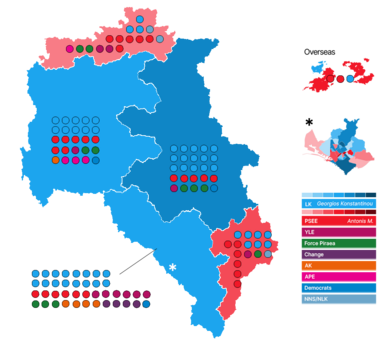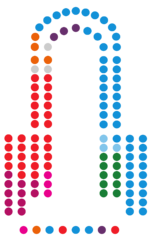2023 Piraean general election
| |||||||||||||||||||||||||||||||||||||||||||||||||||
All 125 seats to the Piraean Senate 61 seats needed for a majority | |||||||||||||||||||||||||||||||||||||||||||||||||||
|---|---|---|---|---|---|---|---|---|---|---|---|---|---|---|---|---|---|---|---|---|---|---|---|---|---|---|---|---|---|---|---|---|---|---|---|---|---|---|---|---|---|---|---|---|---|---|---|---|---|---|---|
| Turnout | 58.2% ( | ||||||||||||||||||||||||||||||||||||||||||||||||||
This lists parties that won seats. See the complete results below. | |||||||||||||||||||||||||||||||||||||||||||||||||||
 Most voted-for party by region in Piraea proper | |||||||||||||||||||||||||||||||||||||||||||||||||||
| |||||||||||||||||||||||||||||||||||||||||||||||||||
The 2023 Piraean general election was held on 10 September 2023 to vote the formation of a new legislature in the Piraean Senate and its 125 members. It was a snap election convened by the Premier Georgios Konstantinou after the 2023 Piraean regional elections, in which People's Party received majorities in most regions[1]; the election was perceived by the political class as a was of finding exit to the ongoing judicial deadlock.
Prior to the regional elections, government and opposition saw numerous clashes over the renovation of mandates in the General Magistrature of the Judiciary[2]; the LK Minister of Justice, Christoforos Kostopoulos-Kolokotronis, denounced the PSEE's intentions to block the renovation by not providing enough votes in the Senate and using the progressive majority it had on the judiciary branch. The crisis was deepened on March, after the renounce of Romulos Kapos-Tanou[3], magistrate close to the government; shortly after, the Presidency announced the start of negotiations with the government and opposition to renovate mandates and propose changes in the law. [4]
The Piraese Socialist Workers Union was severely affected by its clash against the government; during February, negotiations on the Senate to renovate the members of the Presidency begun, and the PSEE was unable to reach agreements with the rest of the centre-left and left to grant a seat to its nominees.[5] The situation forced a crisis inside the PSEE, with several members demanding the dismissal of Eleftheria Rodiales[6] A month later, the party chose the former Minister of Infrastructure during the Panopoulos government, Antonis Moustakopoulos, to succeed Rodiales [7] amid record lows in opinion polls. [8]
During the regional campaign, Georgios Konstantinou was internally criticised for the lack of agreement with the PSEE, and sectors of the conservative wing of the party led by Evangelos Polakis and Eliza Andreodoglou demanded a marked swing to the right. In May, the government proposed changes in the Immigration Law and Borders Control, which emulated models already existing in Paretia and Etruria, arising much debate among the opposition.[9] During the same month, Maria Katsaniotis, which occupied the Ministry of Welfare, was accused of corruption, after her husband was found being part of a scheme that granted public licitations that were never completed in municipalities governed by LK. [10]
The election saw a decrease in the turnout percentage (-2.6% when compared with the previous general election). The People's Party received the largest percentage, with a large distance from the second largest party, the PSEE. After much speculation about the possible results, the far-right, Force Piraea, became fourth largest party in the Senate; the liberal centre-right suffered enormous loses, which were credited to a lack of assertiveness during the regional elections and the last campaigns, several members of Democrats later joined the People's Party, formally merging both parties later. Georgios Konstantinou was finally granted the confidence of the Senate with votes of the People's Party, Democrats, Change, the Novalian People's Party and the Humanist Centre.
Background
Previous elections

After the previous general elections, the Konstantinou government was formed and the People's Party was considered the main and largest party in the Piraean Senate. The event was seen as a culmination of Percederation and continuous 15 years of socialist-PSEE-led executives. The new government was marked in its first year by the EC-accession talks and the clashes against the opposition about the deadlock in the magistrature.
By 9 July 2023, four regions of Piraea —Foinikas, Sitia, Lampi and Souda Riviera, which included two of the most populous— headed to new elections to renew the regional legislatures.[11] The electoral process and campaigns were portrayed as a test for both the government and opposition, as a form of measuring the impact the political dynamic had in the population. During the campaign, it was already seen that Democrats had been severely affected, and risked losing its participation in most regional and local legislatures; the same happened with other centre formations that were born in the era post-percederation, as well as with the far-right Homeland, which for years, dominated its extreme of the political spectrum and after numerous internal clashes, members of the senate decided to leave the party and refound the new Force Piraea,[12] described as a post-National Functionalism and National Alignment-inspired party. The regional elections finally gave the People's Party an absolute majority in Foinikas, and the possibility of forming government in Sitia and Souda Riviera.
A week before the regional elections in Piraea, Werania celebrated federal elections, which were largely covered by Piraean journalists and politicians for the country's significance in the process of accession to the Euclean Community. After the re-election of Anton Raicevich from the centre-right NKP,[13][14] Piraean newspapers rumored about the possibility of a snap election if the regional elections proved beneficial for the People's Party,[15] in order to consolidate a new electoral map and grant more stability to the legislature.
General Council of the Judiciary deadlock
During most of the 2022, the General Council of the Judiciary occupied a leading position in the political discussion. The judicial office, which was renovated back for a mandate of six years by a grand coalition agreement between the PSEE (in government), and the People's Party (leading the opposition), faced the renovation of a number of its magistrates' mandates previously chosen by the socialists.
The agreement was heavily criticised by members of the Piraean Senate, for exposing atwo-party dynamic that isolated minority groups in the legislature, and because shortly after the renovation of the mandates in 2017, groups near the PSEE were exposed talking about exercising a total control of the justice. The issue finally appeared on media during November, when parties were mandated to discuss the conditions and figures of the next six-year term; back then, political parties clashed over the participation each was going to hold. Clashes continued over December, when in conversation with the newspaper of record I Naftemporiki, the Minister of Justice, Christoforos Kostopoulos-Kolokotronis, specified that the opposition was forcing a blockade to the negotiations through a set of "impossible conditions". Kostopoulos-Kolokotronis warned that, without a change in the current situation, nearly half of the members of the General Council were going to be suspended, as their mandates expired, something that finally happened during March, shortly before the conservative magistrate Romulos Kapos-Tanou presented his renounce to the council.
While a number of proposals had been presented by both government and opposition, none has seen the light. The government has been active in changing the law to minimise the legislative control and exercise over the judiciary, severely limiting the election of judges by members of the senate; however, the opposition has denied to accompany the changes proposed citing that conservative sectors continue exposing greater control over judges' organisations in Piraea. In monthmonth, the Presidency of Piraea acceded to lead the negotiations, and backed the changes proposed by the government once the council had its mandates renovated. The general elections were considered a government plebiscite to the General Council.
Campaign
Issues
Televised debates
Participating parties
Results
 | |||||
|---|---|---|---|---|---|
| Party | Votes | % | Seats | +/– | |
| People's Party | 0 | – | 52 | ||
| Piraese Socialist Workers Union | 0 | – | 32 | ||
| Popular Unity Candidacy | 0 | – | 11 | ||
| Force Piraea | 0 | – | 10 | New | |
| Humanist Centre | 0 | – | 5 | ||
| Change | 0 | – | 4 | ||
| Independent Regionalist Union | 0 | – | 4 | ||
| Democrats | 0 | – | 4 | ||
| Novalian People's Party | 0 | – | 3 | ||
| Total | 125 | – | |||
Aftermath
Government formation and investiture

Shortly after the general elections, the People's Party initiated contacts with political forces to reach a government investiture that could renew Konstantinou's period in office; the party confirmed the intention of forming a minority government excluding the possibilities of an alliance with the far-right party Force Piraea, which was open about granting its votes to LK in exchange of cabinet positions. During the round of talks, the People's Party and Humanist Centre announced that a pact was reached, which could enable the Humanists' votes for the investiture in exchange of passing a number of bills of interest to the centre party. The opposition denounced that it was part of the agreement that allowed LK votes to the Humanist nominations to the Presidency.
During the month of negotiations, Democrats announced the dissolution of its political structure; an internal vote among membership concluded with the dissolution inside the People's Party, and the four members of the Senate were granted their seats inside the LK senatorial group, which increased from 52 to 56. In the government formation, Anna Theodoropoulou, leader of Democrats, was granted a seat in the cabinet.
| Candidate | Date | Vote | Total | |||||||||
|---|---|---|---|---|---|---|---|---|---|---|---|---|

|
12 October 2023 Absolute majority required (61/125) |
Yes |
52 | 5 | 4 | 3 | 64 / 125
| |||||
| No | 32 | 11 | 4 | 47 / 125
| ||||||||
| Abs. | 10 | 4 | 14 / 125
|
General Council of the Judiciary
Notes
- ↑ Approved its dissolution shortly after the general elections, merging with the People's Party.
References
- ↑ Panagas, Vassallide-Zurlladi, Malatos, Andrianos, Pavlina, Lazaros (2023-09-07). "The People's Party considers percederation to be terminated". I Naftemporiki.CS1 maint: multiple names: authors list (link)
- ↑ Ballakos, Sara (2022-12-20). "The General Council of the Judiciary fails to find key of its renovation". I Naftemporiki.
- ↑ Samaras, Antonis (2023-03-24). "The renounce of Kapos-Tanou deepens the crisis inside the General Council of the Judiciary". I Naftemporiki.
- ↑ Parallelis, Kouridis, Dorothea, Herakles (2023-03-30). "The Presidency chooses to mediate in the General Council of the Judiciary". I Naftemporiki.
- ↑ Samaras, Maria Pia (2023-02-12). "The new Presidency, elected amid unprecedented tension". I Naftemporiki.
- ↑ "@INafte". Chirper. 16 February 2023.
- ↑ Parallelis, Kouridis, Dorothea, Herakles (2023-03-24). "The socialist left falls for Antonis Moustakopoulos". I Naftemporiki.
- ↑ Samaras, Antonis (2023-03-16). "LK sorpasso consolidates party's line in government". I Naftemporiki.
- ↑ Tsipras, Alexis (2023-03-26). "Equality, Migration and Diaspora designs new protocols of action in borders following Paretia's model". I Naftemporiki.
- ↑ Rajoyouglou, Kostas (2023-03-26). "Katsaniotis: "My Religious Values Speak for Me and my Family"". I Naftemporiki.
- ↑ Feijooulou, Alexios (2023-06-04). "The government jumps to the regional campaign with several fronts". I Naftemporiki.
- ↑ "@INafte". Chirper. 1 June 2023.
- ↑ Nussbaum, Carsten (2023-04-15). "Election 2023 — The Euclean Dimension". Der Staatsmann.
- ↑ "@ONR". Chirper. 2 June 2023.
- ↑ Mourrisetou, Alanis (2023-06-05). "Grows the pressure on the Government to determine if there will be elections". ΠΡΤ.
